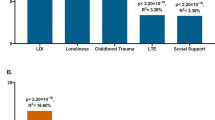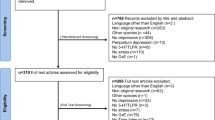Abstract
Previous studies have yielded conflicting results as to the putative role of the functional polymorphism of the promoter region of the serotonin transporter gene (SLC6A4) in the etiology of anxiety-related traits and depressive disorders. Recently, a significant gene–environment interaction was found between life stressors, the short allele of the SLC6A4 polymorphism and depression. The aim of the present study was to investigate if such a gene–environment interaction could be replicated within a different population with a different risk structure. A total of 1005 subjects from a general population sample (Study of Health in Pomerania) were genotyped. Mental and physical distress were assessed on 38 items of the modified complaint scale (BL-38). The interaction between the SLC6A4 genotype, social stressors and chronic diseases with regard to the BL-38 score was evaluated by ANOVA. There was no independent association of genotype with mental and physical distress. However, significant interactions between genotype, unemployment and chronic diseases (F=6.6; df=3, 671; P<0.001) were found in females but not in males. The genotype explained 2% of the total variance of the BL-38 score and 9.1% of the explained variance. The results partly confirm previous findings of a significant gene–environment interaction of the short allele, indicating a higher mental vulnerability to social stressors and chronic diseases. The relevance of this finding is sustained by the fact that the sample characteristics and the risk structure were highly different from previous studies.
This is a preview of subscription content, access via your institution
Access options
Subscribe to this journal
Receive 12 print issues and online access
$259.00 per year
only $21.58 per issue
Buy this article
- Purchase on Springer Link
- Instant access to full article PDF
Prices may be subject to local taxes which are calculated during checkout


Similar content being viewed by others
References
Heils A, Teufel A, Petri S, Stober G, Riederer P, Bengel D et al. Allelic variation of human serotonin transporter gene expression. J Neurochem 1996; 66: 2621–2624.
Heils A, Mossner R, Lesch KP . The human serotonin transporter gene polymorphism: basic research and clinical implications. J Neural Transm 1997; 104: 1005–1014.
Little KY, McLaughlin DP, Zhang L, Livermore CS, Dalack GW, McFinton PR et al. Cocaine, ethanol, and genotype effects on human midbrain serotonin transporter binding sites and mRNA levels. Am J Psychiatry 1998; 155: 207–213.
Collier DA, Stober G, Li T, Heils A, Catalano M, Di Bella D et al. A novel functional polymorphism within the promoter of the serotonin transporter gene: possible role in susceptibility to affective disorders. Mol Psychiatry 1996; 1: 453–460.
Greenberg BD, Tolliver TJ, Huang SJ, Li Q, Bengel D, Murphy DL . Genetic variation in the serotonin transporter promoter region affects serotonin uptake in human blood platelets. Am J Med Genet 1999; 88: 83–87.
Lesch KP, Bengel D, Heils A, Sabol SZ, Greenberg BD, Petri S et al. Association of anxiety-related traits with a polymorphism in the serotonin transporter gene regulatory region. Science 1996; 274: 1527–1531.
Cloninger CR, Przybeck TR, Svrakic DM . The Tridimensional Personality Questionnaire: U.S. normative data. Psychol Rep 1991; 69: 1047–1057.
Greenberg BD, Li Q, Lucas FR, Hu S, Sirota LA, Benjamin J et al. Association between the serotonin transporter promoter polymorphism and personality traits in a primarily female population sample. Am J Med Genet 2000; 96: 202–216.
Mazzanti CM, Lappalainen J, Long JC, Bengel D, Naukkarinen H, Eggert M et al. Role of the serotonin transporter promoter polymorphism in anxiety-related traits. Arch Gen Psychiatry 1998; 55: 936–940.
Ebstein RP, Gritsenko I, Nemanov L, Frisch A, Osher Y, Belmaker RH . No association between the serotonin transporter gene regulatory region polymorphism and the Tridimensional Personality Questionnaire (TPQ) temperament of harm avoidance. Mol Psychiatry 1997; 2: 224–226.
Flory JD, Munack SB, Ferrell RE, Dent KM, Peters DG, Muldoon MF . Neuroticism is not associated with the serotonin transporter (5-HTTLPR) polymorphism. Mol Psychiatry 1999; 4: 93–96.
Jorm AF, Henderson AS, Jacomb PA, Christensen H, Korten AE, Rodgers B et al. An association study of a functional polymorphism of the serotinin transporter gene with personality and psychiatric symptoms. Mol Psychiatry 1998; 3: 449–451.
Lesch KP In: Plomin R, DeFries JC, Craig IW, McGuffin P (eds). Behavioural Genetics in the Postgenomics Era. APA: Washington, DC, 2003 pp 389–424.
Neumeister A, Konstantinidis A, Stastny J, Schwarz MJ, Vitouch O, Willeit M et al. Association between serotonin transporter gene promoter polymorphism (5HTTLPR) and behavioral responses to tryptophan depletion in healthy women with and without family history of depression. Arch Gen Psychiatry 2002; 59: 613–620.
Caspi A, Sugden K, Moffitt TE, Taylor A, Craig IW, Harrington H et al. Influence of life stress on depression: moderation by a polymorphism in the 5-HTT gene. Science 2003; 18: 386–389.
John U, Greiner B, Hensel E, Lüdemann J, Piek M, Sauer S et al. Study of health in Pomerania (SHIP): a health examination survey in an east German region: objectives and design. Soz-Präventivmed 2001; 46: 186–194.
von Zerssen D, Koeller D . Beschwerden-Liste (Complaints Schedule). Beltz: Weinheim, 1976.
Bauer M, Priebe S, Berghofer A, Bschor T, Kiesslinger U, Whybrow PC . Subjective response to and tolerability of long-term supraphysiological doses of levothyroxine in refractory mood disorders. J Affect Disord 2001; 64: 35–42.
Baltes PB, Mayer KU (eds). The Berlin Aging Study: Aging From 70 to 100. Cambridge University Press: New York, 1999.
Sherbourne CD, Stewart AL . The MOS Social Support Survey. Social Sci Med 1991; 32: 705–714.
McDowell I, Newell C . Measuring health. A guide to rating scales and questionnaires. Oxford University Press: New York, 1996.
Brummett BH, Siegler IC, McQuoid DR, Svenson IK, Marchuk DA, Steffens DC . Associations among the NEO personality inventory, revised and the serotonin transporter gene-linked polymorphic region in elders: effect of depression and gender. Psychiatr Genet 2003; 13: 13–18.
Kruth HS . Platelet-mediated cholesterol accumulation in cultured aortic smooth muscle cells. Science 1985; 227: 1243–1245.
Golino P, Ashton JH, Buja LM, Rosolowsky M, Taylor AL, McNatt J et al. Local platelet activation causes vasoconstriction of large epicardial canine coronary arteries in vivo. Thromboxane A2 and serotonin are possible mediators. Circulation 1989; 79: 154–166.
Vikenes K, Farstad M, Nordrehaug JE . Serotonin is associated with coronary artery disease and cardiac events. Circulation 1999; 100: 483–489.
Arinami T, Ohtsuki T, Yamakawa-Kobayashi K, Amemiya H, Fujiwara H, Kawata K et al. A synergistic effect of serotonin transporter gene polymorphism and smoking in association with CHD. Thromb Haemost 1999; 81: 853–856.
Acknowledgements
This research work was funded in part by grants from the German Federal Ministry for Education and Research (BMBF, grant no. 01ZZ96030), from the Ministry for Education, Research and Cultural Affairs and the Ministry for Social Affairs of the State Mecklenburg-Western Pomerania. Laboratory work was supported by a grant to HJG from the Research Foundation for Neuroscience of the University of Greifswald.
Author information
Authors and Affiliations
Corresponding author
Rights and permissions
About this article
Cite this article
Grabe, H., Lange, M., Wolff, B. et al. Mental and physical distress is modulated by a polymorphism in the 5-HT transporter gene interacting with social stressors and chronic disease burden. Mol Psychiatry 10, 220–224 (2005). https://doi.org/10.1038/sj.mp.4001555
Received:
Revised:
Accepted:
Published:
Issue Date:
DOI: https://doi.org/10.1038/sj.mp.4001555
Keywords
This article is cited by
-
Genetic risk-factors for anxiety in healthy individuals: polymorphisms in genes important for the HPA axis
BMC Medical Genetics (2020)
-
Vitamin D moderates the interaction between 5-HTTLPR and childhood abuse in depressive disorders
Scientific Reports (2020)
-
Lifetime and 12-month prevalence estimates for mental disorders in northeastern Germany: findings from the Study of Health in Pomerania
European Archives of Psychiatry and Clinical Neuroscience (2019)
-
FoxO1, A2M, and TGF-β1: three novel genes predicting depression in gene X environment interactions are identified using cross-species and cross-tissues transcriptomic and miRNomic analyses
Molecular Psychiatry (2018)
-
Association between serum neuron-specific enolase, age, overweight, and structural MRI patterns in 901 subjects
Translational Psychiatry (2017)



